Reflective Essay: My Evolving Change Management Philosophy
VerifiedAdded on 2023/06/04
|13
|2820
|307
Essay
AI Summary
This essay presents a reflective account of the author's evolving change management philosophy, shaped by coursework, personal experiences, case studies, guest lectures, and MBA studies. The author explores the crucial roles of leadership, organizational culture, and communication in effectively managing organizational change. Initially holding certain beliefs about change being primarily reactive and top-down, the author's perspective shifted to recognize change as a proactive strategy for innovation and competitive advantage. The importance of leadership in fostering a change-embracing mindset, the impact of organizational culture in facilitating or hindering change adoption, and the necessity of two-way communication for successful change implementation are highlighted. The essay concludes by emphasizing the need for leaders to manage change proactively and cultivate a supportive organizational culture to ensure positive outcomes.
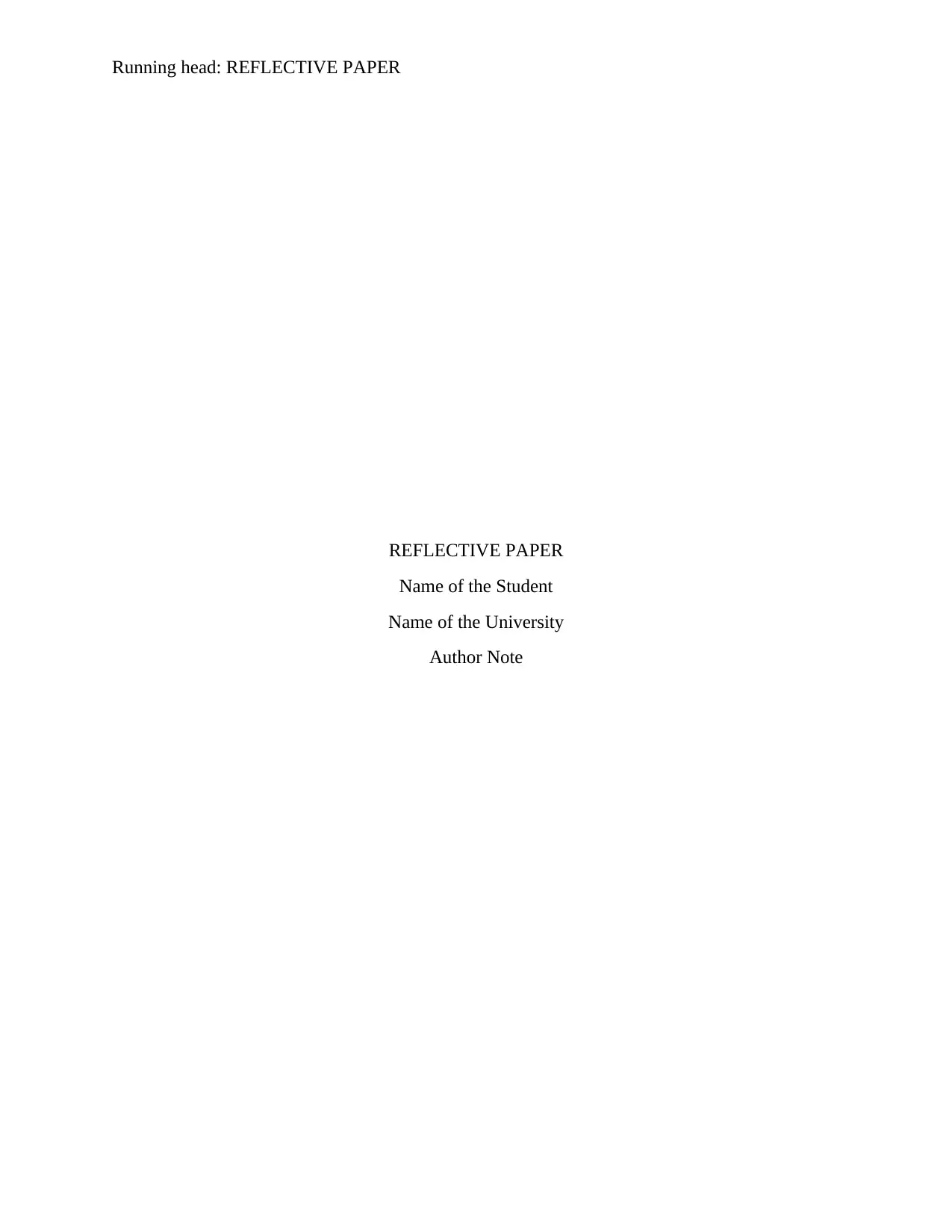
Running head: REFLECTIVE PAPER
REFLECTIVE PAPER
Name of the Student
Name of the University
Author Note
REFLECTIVE PAPER
Name of the Student
Name of the University
Author Note
Paraphrase This Document
Need a fresh take? Get an instant paraphrase of this document with our AI Paraphraser
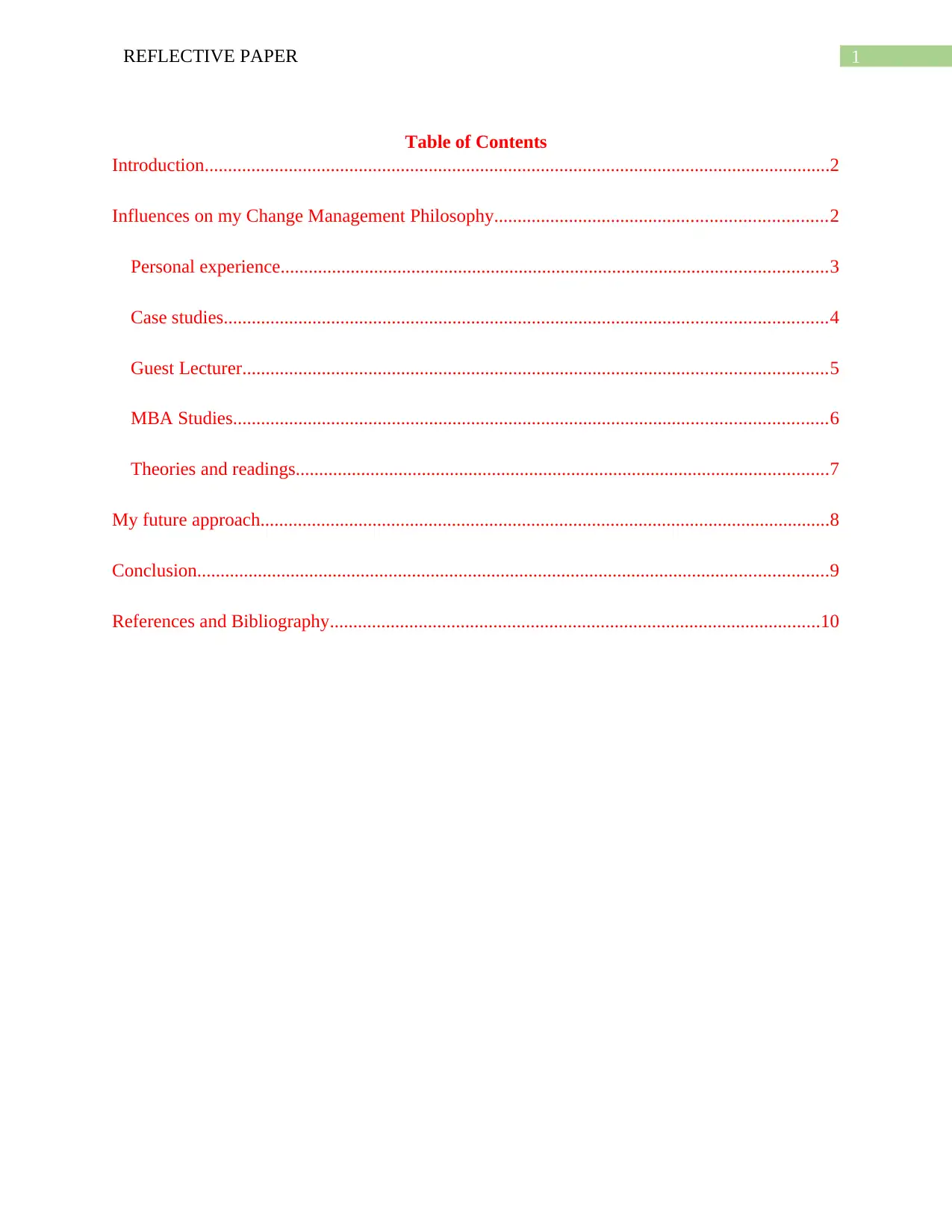
1REFLECTIVE PAPER
Table of Contents
Introduction......................................................................................................................................2
Influences on my Change Management Philosophy.......................................................................2
Personal experience.....................................................................................................................3
Case studies.................................................................................................................................4
Guest Lecturer.............................................................................................................................5
MBA Studies...............................................................................................................................6
Theories and readings..................................................................................................................7
My future approach..........................................................................................................................8
Conclusion.......................................................................................................................................9
References and Bibliography.........................................................................................................10
Table of Contents
Introduction......................................................................................................................................2
Influences on my Change Management Philosophy.......................................................................2
Personal experience.....................................................................................................................3
Case studies.................................................................................................................................4
Guest Lecturer.............................................................................................................................5
MBA Studies...............................................................................................................................6
Theories and readings..................................................................................................................7
My future approach..........................................................................................................................8
Conclusion.......................................................................................................................................9
References and Bibliography.........................................................................................................10
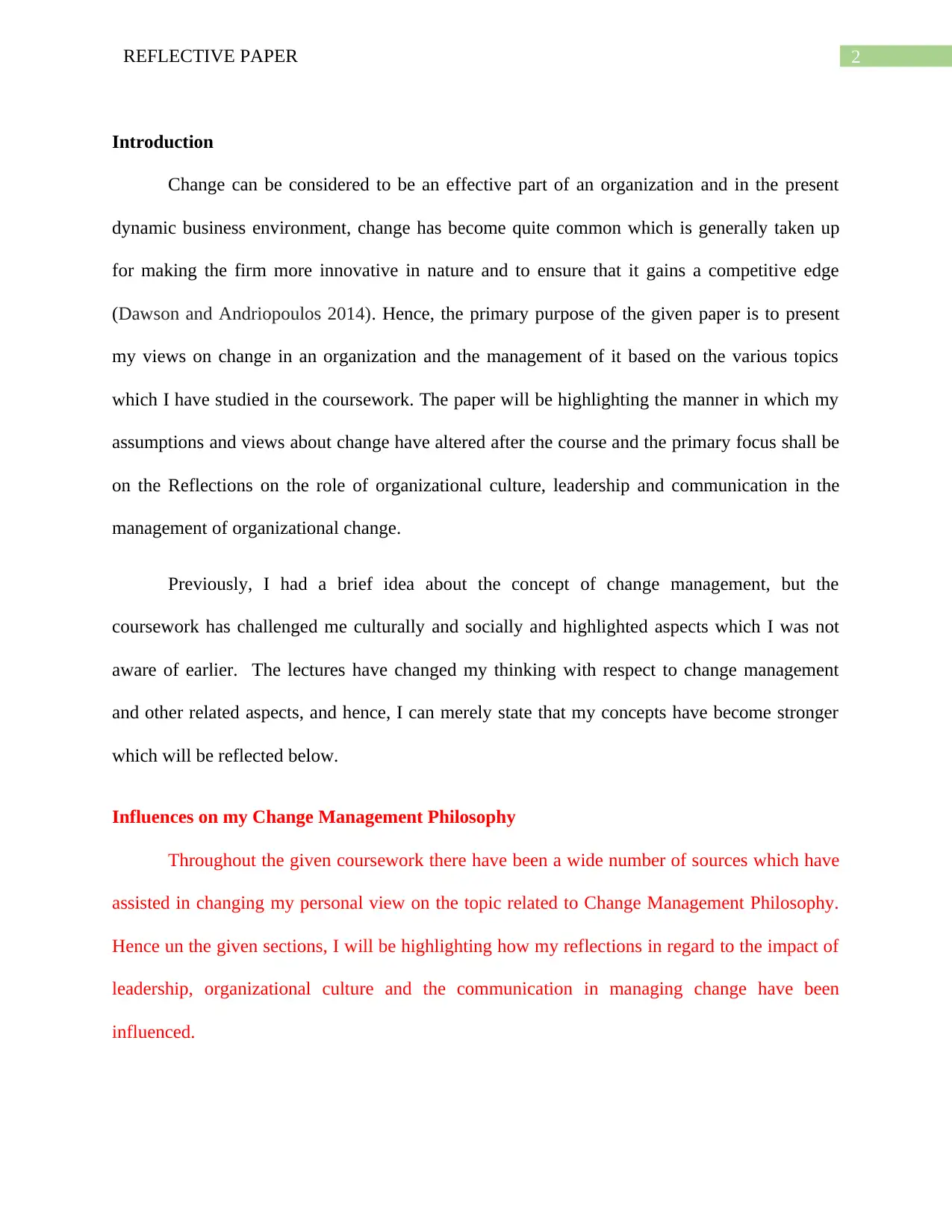
2REFLECTIVE PAPER
Introduction
Change can be considered to be an effective part of an organization and in the present
dynamic business environment, change has become quite common which is generally taken up
for making the firm more innovative in nature and to ensure that it gains a competitive edge
(Dawson and Andriopoulos 2014). Hence, the primary purpose of the given paper is to present
my views on change in an organization and the management of it based on the various topics
which I have studied in the coursework. The paper will be highlighting the manner in which my
assumptions and views about change have altered after the course and the primary focus shall be
on the Reflections on the role of organizational culture, leadership and communication in the
management of organizational change.
Previously, I had a brief idea about the concept of change management, but the
coursework has challenged me culturally and socially and highlighted aspects which I was not
aware of earlier. The lectures have changed my thinking with respect to change management
and other related aspects, and hence, I can merely state that my concepts have become stronger
which will be reflected below.
Influences on my Change Management Philosophy
Throughout the given coursework there have been a wide number of sources which have
assisted in changing my personal view on the topic related to Change Management Philosophy.
Hence un the given sections, I will be highlighting how my reflections in regard to the impact of
leadership, organizational culture and the communication in managing change have been
influenced.
Introduction
Change can be considered to be an effective part of an organization and in the present
dynamic business environment, change has become quite common which is generally taken up
for making the firm more innovative in nature and to ensure that it gains a competitive edge
(Dawson and Andriopoulos 2014). Hence, the primary purpose of the given paper is to present
my views on change in an organization and the management of it based on the various topics
which I have studied in the coursework. The paper will be highlighting the manner in which my
assumptions and views about change have altered after the course and the primary focus shall be
on the Reflections on the role of organizational culture, leadership and communication in the
management of organizational change.
Previously, I had a brief idea about the concept of change management, but the
coursework has challenged me culturally and socially and highlighted aspects which I was not
aware of earlier. The lectures have changed my thinking with respect to change management
and other related aspects, and hence, I can merely state that my concepts have become stronger
which will be reflected below.
Influences on my Change Management Philosophy
Throughout the given coursework there have been a wide number of sources which have
assisted in changing my personal view on the topic related to Change Management Philosophy.
Hence un the given sections, I will be highlighting how my reflections in regard to the impact of
leadership, organizational culture and the communication in managing change have been
influenced.
⊘ This is a preview!⊘
Do you want full access?
Subscribe today to unlock all pages.

Trusted by 1+ million students worldwide
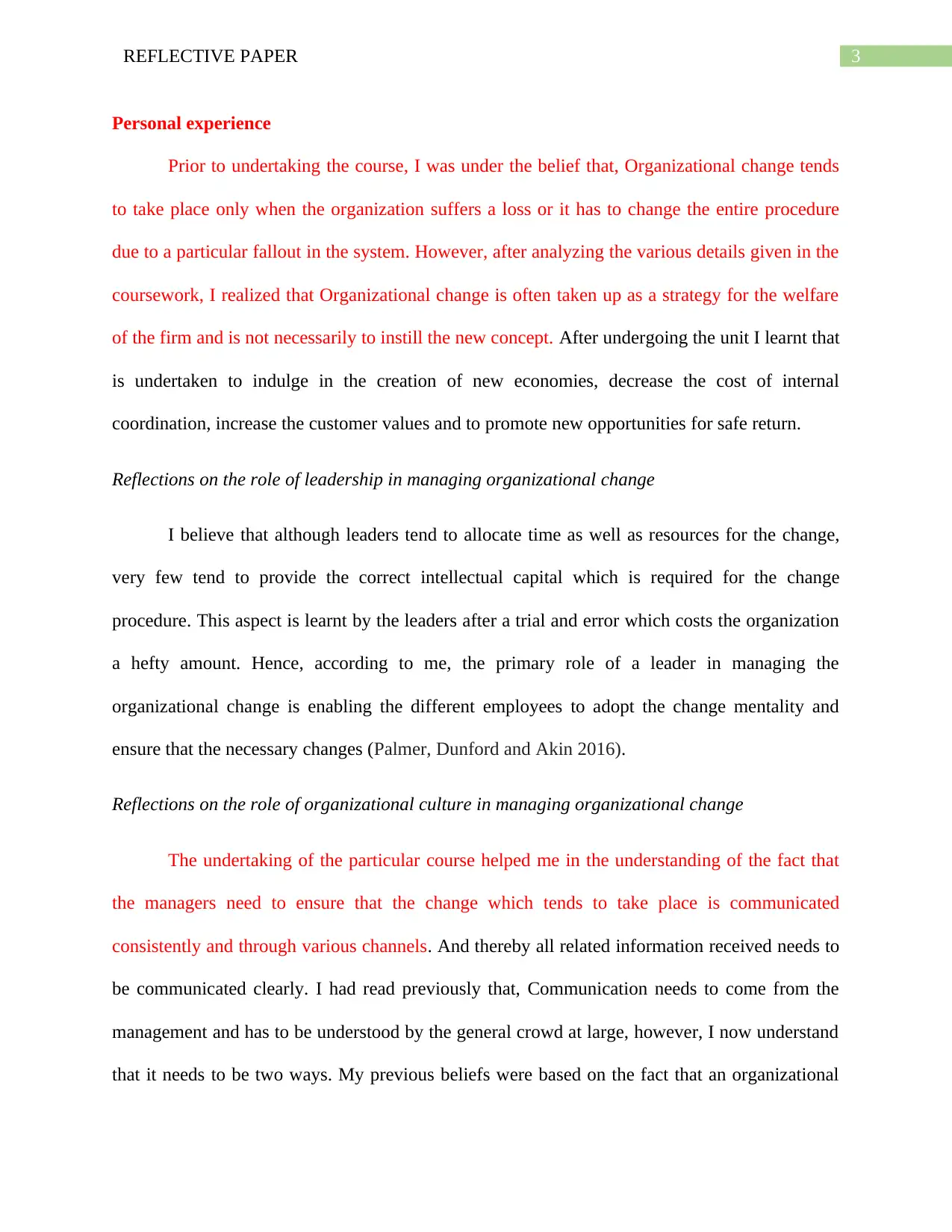
3REFLECTIVE PAPER
Personal experience
Prior to undertaking the course, I was under the belief that, Organizational change tends
to take place only when the organization suffers a loss or it has to change the entire procedure
due to a particular fallout in the system. However, after analyzing the various details given in the
coursework, I realized that Organizational change is often taken up as a strategy for the welfare
of the firm and is not necessarily to instill the new concept. After undergoing the unit I learnt that
is undertaken to indulge in the creation of new economies, decrease the cost of internal
coordination, increase the customer values and to promote new opportunities for safe return.
Reflections on the role of leadership in managing organizational change
I believe that although leaders tend to allocate time as well as resources for the change,
very few tend to provide the correct intellectual capital which is required for the change
procedure. This aspect is learnt by the leaders after a trial and error which costs the organization
a hefty amount. Hence, according to me, the primary role of a leader in managing the
organizational change is enabling the different employees to adopt the change mentality and
ensure that the necessary changes (Palmer, Dunford and Akin 2016).
Reflections on the role of organizational culture in managing organizational change
The undertaking of the particular course helped me in the understanding of the fact that
the managers need to ensure that the change which tends to take place is communicated
consistently and through various channels. And thereby all related information received needs to
be communicated clearly. I had read previously that, Communication needs to come from the
management and has to be understood by the general crowd at large, however, I now understand
that it needs to be two ways. My previous beliefs were based on the fact that an organizational
Personal experience
Prior to undertaking the course, I was under the belief that, Organizational change tends
to take place only when the organization suffers a loss or it has to change the entire procedure
due to a particular fallout in the system. However, after analyzing the various details given in the
coursework, I realized that Organizational change is often taken up as a strategy for the welfare
of the firm and is not necessarily to instill the new concept. After undergoing the unit I learnt that
is undertaken to indulge in the creation of new economies, decrease the cost of internal
coordination, increase the customer values and to promote new opportunities for safe return.
Reflections on the role of leadership in managing organizational change
I believe that although leaders tend to allocate time as well as resources for the change,
very few tend to provide the correct intellectual capital which is required for the change
procedure. This aspect is learnt by the leaders after a trial and error which costs the organization
a hefty amount. Hence, according to me, the primary role of a leader in managing the
organizational change is enabling the different employees to adopt the change mentality and
ensure that the necessary changes (Palmer, Dunford and Akin 2016).
Reflections on the role of organizational culture in managing organizational change
The undertaking of the particular course helped me in the understanding of the fact that
the managers need to ensure that the change which tends to take place is communicated
consistently and through various channels. And thereby all related information received needs to
be communicated clearly. I had read previously that, Communication needs to come from the
management and has to be understood by the general crowd at large, however, I now understand
that it needs to be two ways. My previous beliefs were based on the fact that an organizational
Paraphrase This Document
Need a fresh take? Get an instant paraphrase of this document with our AI Paraphraser
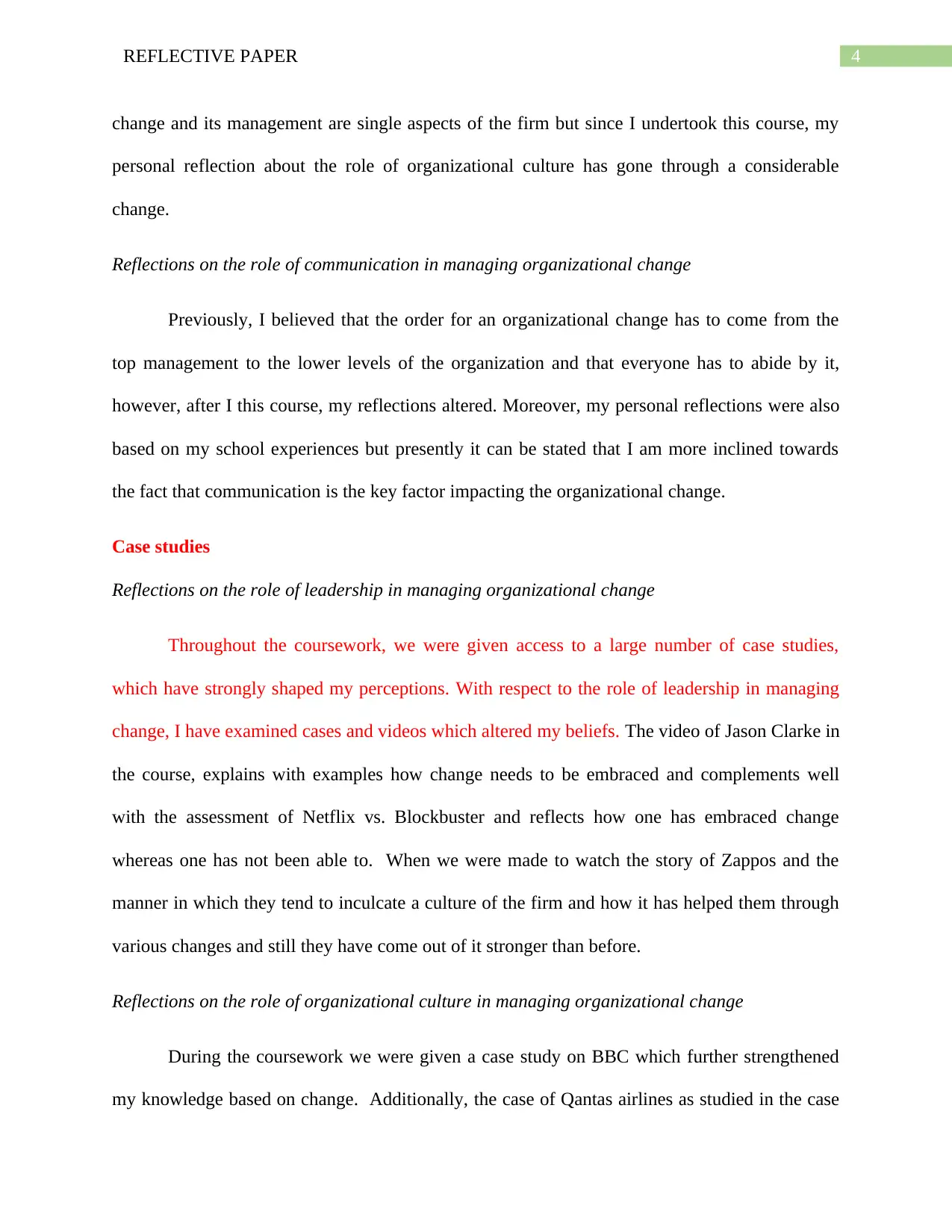
4REFLECTIVE PAPER
change and its management are single aspects of the firm but since I undertook this course, my
personal reflection about the role of organizational culture has gone through a considerable
change.
Reflections on the role of communication in managing organizational change
Previously, I believed that the order for an organizational change has to come from the
top management to the lower levels of the organization and that everyone has to abide by it,
however, after I this course, my reflections altered. Moreover, my personal reflections were also
based on my school experiences but presently it can be stated that I am more inclined towards
the fact that communication is the key factor impacting the organizational change.
Case studies
Reflections on the role of leadership in managing organizational change
Throughout the coursework, we were given access to a large number of case studies,
which have strongly shaped my perceptions. With respect to the role of leadership in managing
change, I have examined cases and videos which altered my beliefs. The video of Jason Clarke in
the course, explains with examples how change needs to be embraced and complements well
with the assessment of Netflix vs. Blockbuster and reflects how one has embraced change
whereas one has not been able to. When we were made to watch the story of Zappos and the
manner in which they tend to inculcate a culture of the firm and how it has helped them through
various changes and still they have come out of it stronger than before.
Reflections on the role of organizational culture in managing organizational change
During the coursework we were given a case study on BBC which further strengthened
my knowledge based on change. Additionally, the case of Qantas airlines as studied in the case
change and its management are single aspects of the firm but since I undertook this course, my
personal reflection about the role of organizational culture has gone through a considerable
change.
Reflections on the role of communication in managing organizational change
Previously, I believed that the order for an organizational change has to come from the
top management to the lower levels of the organization and that everyone has to abide by it,
however, after I this course, my reflections altered. Moreover, my personal reflections were also
based on my school experiences but presently it can be stated that I am more inclined towards
the fact that communication is the key factor impacting the organizational change.
Case studies
Reflections on the role of leadership in managing organizational change
Throughout the coursework, we were given access to a large number of case studies,
which have strongly shaped my perceptions. With respect to the role of leadership in managing
change, I have examined cases and videos which altered my beliefs. The video of Jason Clarke in
the course, explains with examples how change needs to be embraced and complements well
with the assessment of Netflix vs. Blockbuster and reflects how one has embraced change
whereas one has not been able to. When we were made to watch the story of Zappos and the
manner in which they tend to inculcate a culture of the firm and how it has helped them through
various changes and still they have come out of it stronger than before.
Reflections on the role of organizational culture in managing organizational change
During the coursework we were given a case study on BBC which further strengthened
my knowledge based on change. Additionally, the case of Qantas airlines as studied in the case
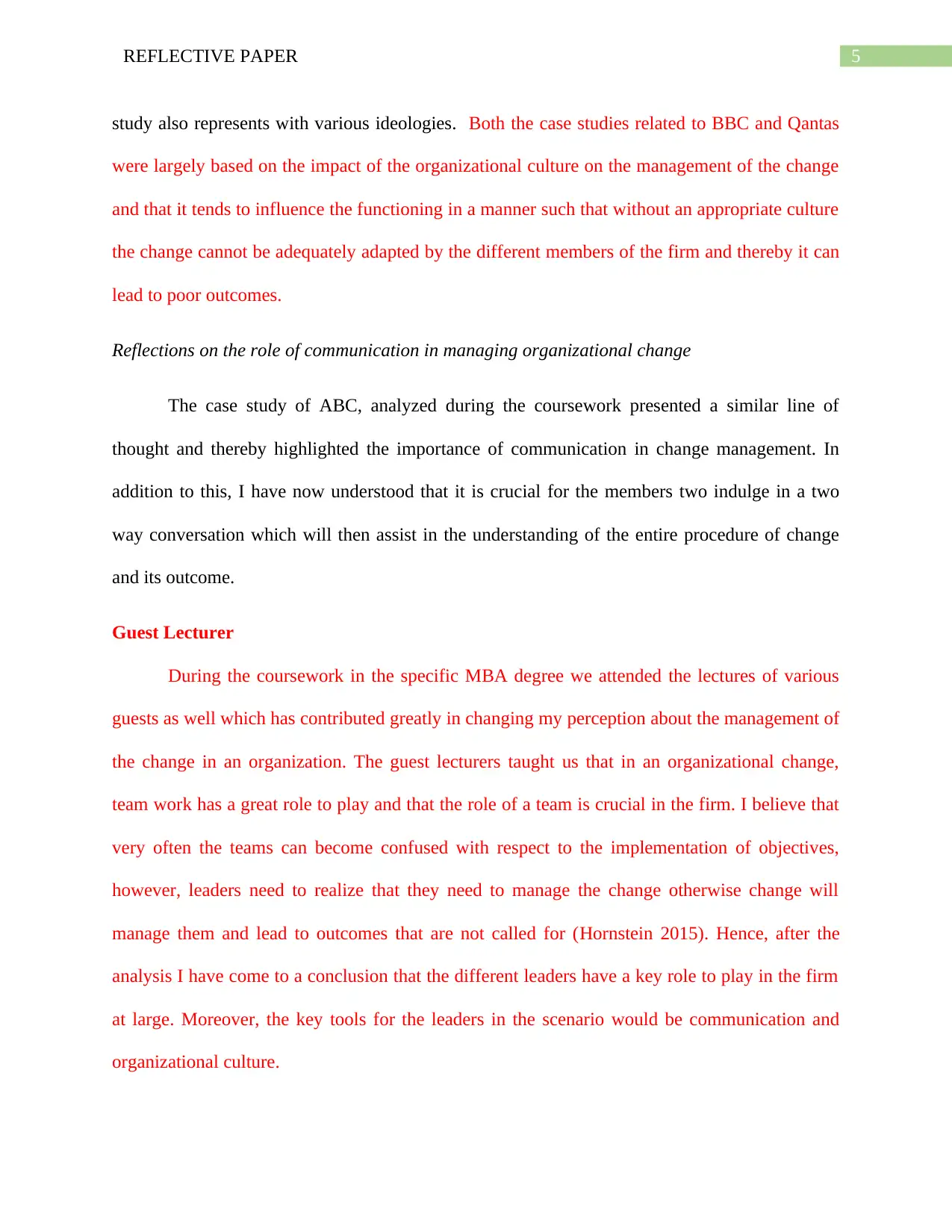
5REFLECTIVE PAPER
study also represents with various ideologies. Both the case studies related to BBC and Qantas
were largely based on the impact of the organizational culture on the management of the change
and that it tends to influence the functioning in a manner such that without an appropriate culture
the change cannot be adequately adapted by the different members of the firm and thereby it can
lead to poor outcomes.
Reflections on the role of communication in managing organizational change
The case study of ABC, analyzed during the coursework presented a similar line of
thought and thereby highlighted the importance of communication in change management. In
addition to this, I have now understood that it is crucial for the members two indulge in a two
way conversation which will then assist in the understanding of the entire procedure of change
and its outcome.
Guest Lecturer
During the coursework in the specific MBA degree we attended the lectures of various
guests as well which has contributed greatly in changing my perception about the management of
the change in an organization. The guest lecturers taught us that in an organizational change,
team work has a great role to play and that the role of a team is crucial in the firm. I believe that
very often the teams can become confused with respect to the implementation of objectives,
however, leaders need to realize that they need to manage the change otherwise change will
manage them and lead to outcomes that are not called for (Hornstein 2015). Hence, after the
analysis I have come to a conclusion that the different leaders have a key role to play in the firm
at large. Moreover, the key tools for the leaders in the scenario would be communication and
organizational culture.
study also represents with various ideologies. Both the case studies related to BBC and Qantas
were largely based on the impact of the organizational culture on the management of the change
and that it tends to influence the functioning in a manner such that without an appropriate culture
the change cannot be adequately adapted by the different members of the firm and thereby it can
lead to poor outcomes.
Reflections on the role of communication in managing organizational change
The case study of ABC, analyzed during the coursework presented a similar line of
thought and thereby highlighted the importance of communication in change management. In
addition to this, I have now understood that it is crucial for the members two indulge in a two
way conversation which will then assist in the understanding of the entire procedure of change
and its outcome.
Guest Lecturer
During the coursework in the specific MBA degree we attended the lectures of various
guests as well which has contributed greatly in changing my perception about the management of
the change in an organization. The guest lecturers taught us that in an organizational change,
team work has a great role to play and that the role of a team is crucial in the firm. I believe that
very often the teams can become confused with respect to the implementation of objectives,
however, leaders need to realize that they need to manage the change otherwise change will
manage them and lead to outcomes that are not called for (Hornstein 2015). Hence, after the
analysis I have come to a conclusion that the different leaders have a key role to play in the firm
at large. Moreover, the key tools for the leaders in the scenario would be communication and
organizational culture.
⊘ This is a preview!⊘
Do you want full access?
Subscribe today to unlock all pages.

Trusted by 1+ million students worldwide

6REFLECTIVE PAPER
Paraphrase This Document
Need a fresh take? Get an instant paraphrase of this document with our AI Paraphraser
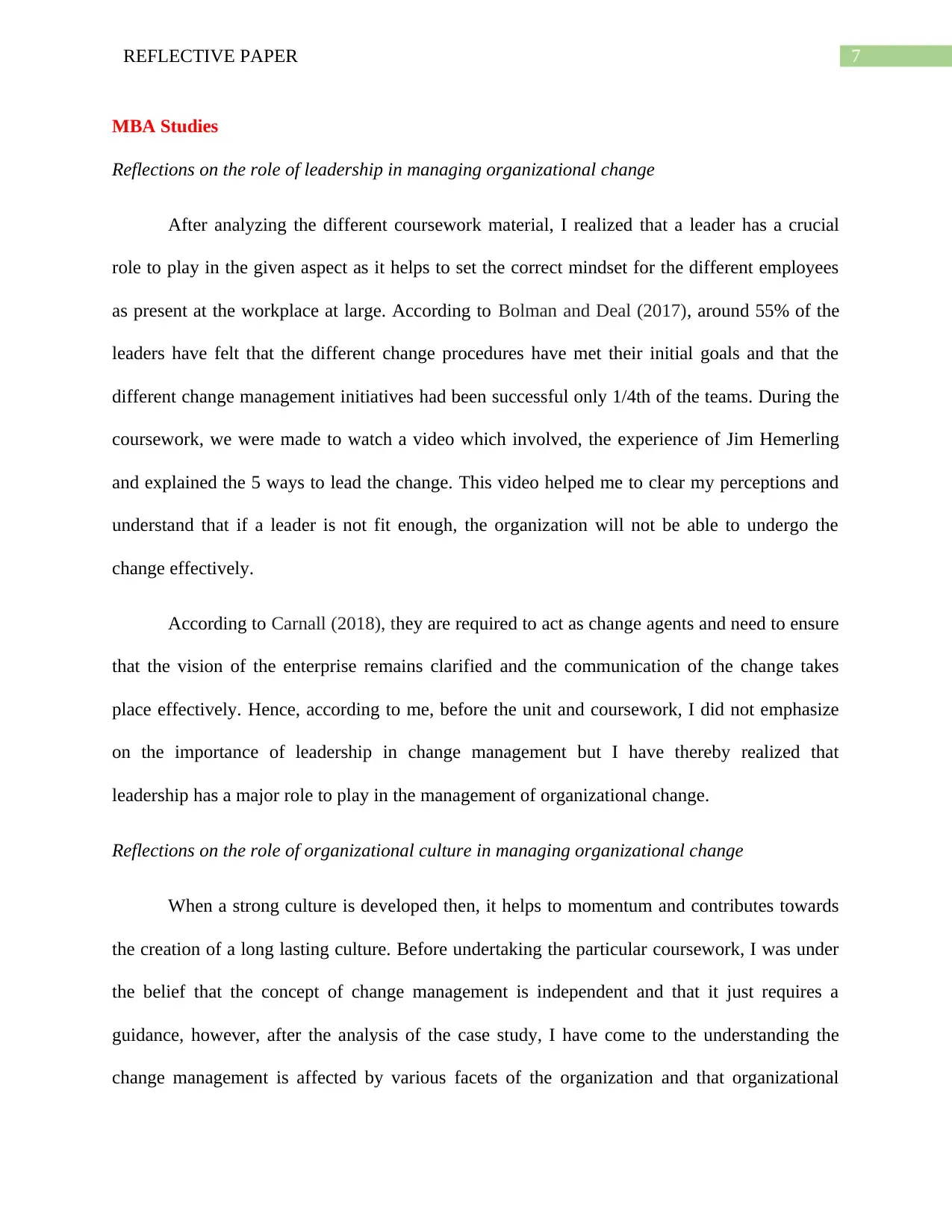
7REFLECTIVE PAPER
MBA Studies
Reflections on the role of leadership in managing organizational change
After analyzing the different coursework material, I realized that a leader has a crucial
role to play in the given aspect as it helps to set the correct mindset for the different employees
as present at the workplace at large. According to Bolman and Deal (2017), around 55% of the
leaders have felt that the different change procedures have met their initial goals and that the
different change management initiatives had been successful only 1/4th of the teams. During the
coursework, we were made to watch a video which involved, the experience of Jim Hemerling
and explained the 5 ways to lead the change. This video helped me to clear my perceptions and
understand that if a leader is not fit enough, the organization will not be able to undergo the
change effectively.
According to Carnall (2018), they are required to act as change agents and need to ensure
that the vision of the enterprise remains clarified and the communication of the change takes
place effectively. Hence, according to me, before the unit and coursework, I did not emphasize
on the importance of leadership in change management but I have thereby realized that
leadership has a major role to play in the management of organizational change.
Reflections on the role of organizational culture in managing organizational change
When a strong culture is developed then, it helps to momentum and contributes towards
the creation of a long lasting culture. Before undertaking the particular coursework, I was under
the belief that the concept of change management is independent and that it just requires a
guidance, however, after the analysis of the case study, I have come to the understanding the
change management is affected by various facets of the organization and that organizational
MBA Studies
Reflections on the role of leadership in managing organizational change
After analyzing the different coursework material, I realized that a leader has a crucial
role to play in the given aspect as it helps to set the correct mindset for the different employees
as present at the workplace at large. According to Bolman and Deal (2017), around 55% of the
leaders have felt that the different change procedures have met their initial goals and that the
different change management initiatives had been successful only 1/4th of the teams. During the
coursework, we were made to watch a video which involved, the experience of Jim Hemerling
and explained the 5 ways to lead the change. This video helped me to clear my perceptions and
understand that if a leader is not fit enough, the organization will not be able to undergo the
change effectively.
According to Carnall (2018), they are required to act as change agents and need to ensure
that the vision of the enterprise remains clarified and the communication of the change takes
place effectively. Hence, according to me, before the unit and coursework, I did not emphasize
on the importance of leadership in change management but I have thereby realized that
leadership has a major role to play in the management of organizational change.
Reflections on the role of organizational culture in managing organizational change
When a strong culture is developed then, it helps to momentum and contributes towards
the creation of a long lasting culture. Before undertaking the particular coursework, I was under
the belief that the concept of change management is independent and that it just requires a
guidance, however, after the analysis of the case study, I have come to the understanding the
change management is affected by various facets of the organization and that organizational
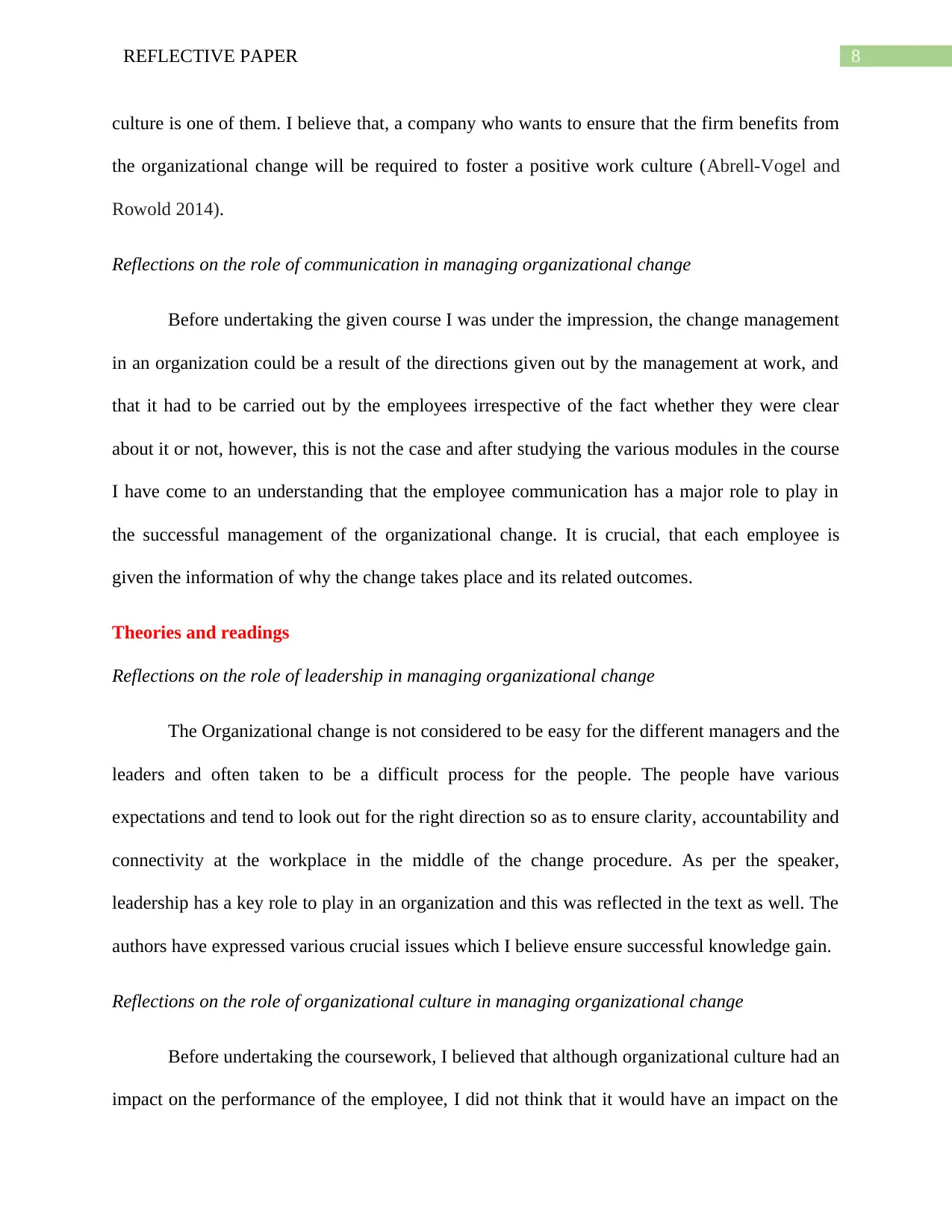
8REFLECTIVE PAPER
culture is one of them. I believe that, a company who wants to ensure that the firm benefits from
the organizational change will be required to foster a positive work culture (Abrell-Vogel and
Rowold 2014).
Reflections on the role of communication in managing organizational change
Before undertaking the given course I was under the impression, the change management
in an organization could be a result of the directions given out by the management at work, and
that it had to be carried out by the employees irrespective of the fact whether they were clear
about it or not, however, this is not the case and after studying the various modules in the course
I have come to an understanding that the employee communication has a major role to play in
the successful management of the organizational change. It is crucial, that each employee is
given the information of why the change takes place and its related outcomes.
Theories and readings
Reflections on the role of leadership in managing organizational change
The Organizational change is not considered to be easy for the different managers and the
leaders and often taken to be a difficult process for the people. The people have various
expectations and tend to look out for the right direction so as to ensure clarity, accountability and
connectivity at the workplace in the middle of the change procedure. As per the speaker,
leadership has a key role to play in an organization and this was reflected in the text as well. The
authors have expressed various crucial issues which I believe ensure successful knowledge gain.
Reflections on the role of organizational culture in managing organizational change
Before undertaking the coursework, I believed that although organizational culture had an
impact on the performance of the employee, I did not think that it would have an impact on the
culture is one of them. I believe that, a company who wants to ensure that the firm benefits from
the organizational change will be required to foster a positive work culture (Abrell-Vogel and
Rowold 2014).
Reflections on the role of communication in managing organizational change
Before undertaking the given course I was under the impression, the change management
in an organization could be a result of the directions given out by the management at work, and
that it had to be carried out by the employees irrespective of the fact whether they were clear
about it or not, however, this is not the case and after studying the various modules in the course
I have come to an understanding that the employee communication has a major role to play in
the successful management of the organizational change. It is crucial, that each employee is
given the information of why the change takes place and its related outcomes.
Theories and readings
Reflections on the role of leadership in managing organizational change
The Organizational change is not considered to be easy for the different managers and the
leaders and often taken to be a difficult process for the people. The people have various
expectations and tend to look out for the right direction so as to ensure clarity, accountability and
connectivity at the workplace in the middle of the change procedure. As per the speaker,
leadership has a key role to play in an organization and this was reflected in the text as well. The
authors have expressed various crucial issues which I believe ensure successful knowledge gain.
Reflections on the role of organizational culture in managing organizational change
Before undertaking the coursework, I believed that although organizational culture had an
impact on the performance of the employee, I did not think that it would have an impact on the
⊘ This is a preview!⊘
Do you want full access?
Subscribe today to unlock all pages.

Trusted by 1+ million students worldwide
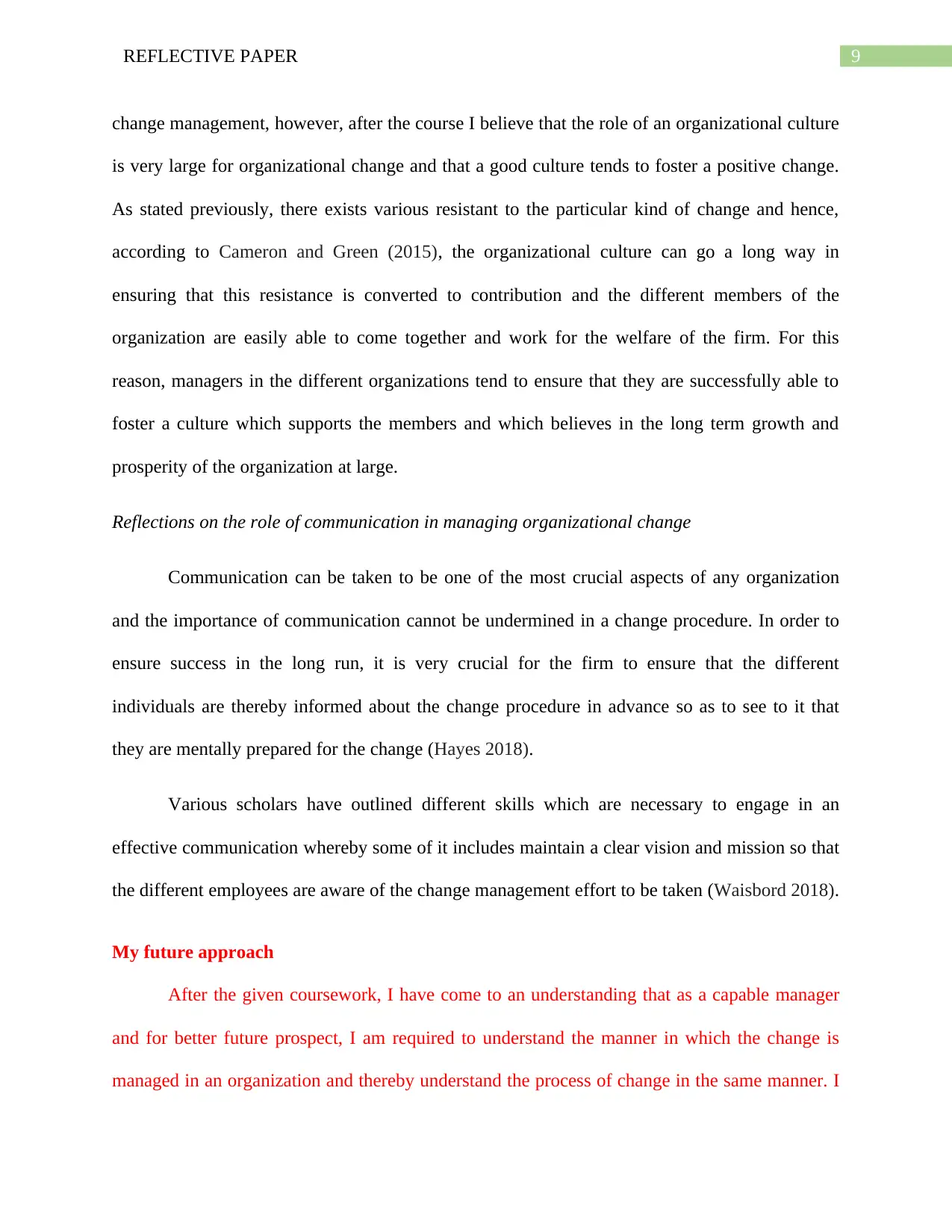
9REFLECTIVE PAPER
change management, however, after the course I believe that the role of an organizational culture
is very large for organizational change and that a good culture tends to foster a positive change.
As stated previously, there exists various resistant to the particular kind of change and hence,
according to Cameron and Green (2015), the organizational culture can go a long way in
ensuring that this resistance is converted to contribution and the different members of the
organization are easily able to come together and work for the welfare of the firm. For this
reason, managers in the different organizations tend to ensure that they are successfully able to
foster a culture which supports the members and which believes in the long term growth and
prosperity of the organization at large.
Reflections on the role of communication in managing organizational change
Communication can be taken to be one of the most crucial aspects of any organization
and the importance of communication cannot be undermined in a change procedure. In order to
ensure success in the long run, it is very crucial for the firm to ensure that the different
individuals are thereby informed about the change procedure in advance so as to see to it that
they are mentally prepared for the change (Hayes 2018).
Various scholars have outlined different skills which are necessary to engage in an
effective communication whereby some of it includes maintain a clear vision and mission so that
the different employees are aware of the change management effort to be taken (Waisbord 2018).
My future approach
After the given coursework, I have come to an understanding that as a capable manager
and for better future prospect, I am required to understand the manner in which the change is
managed in an organization and thereby understand the process of change in the same manner. I
change management, however, after the course I believe that the role of an organizational culture
is very large for organizational change and that a good culture tends to foster a positive change.
As stated previously, there exists various resistant to the particular kind of change and hence,
according to Cameron and Green (2015), the organizational culture can go a long way in
ensuring that this resistance is converted to contribution and the different members of the
organization are easily able to come together and work for the welfare of the firm. For this
reason, managers in the different organizations tend to ensure that they are successfully able to
foster a culture which supports the members and which believes in the long term growth and
prosperity of the organization at large.
Reflections on the role of communication in managing organizational change
Communication can be taken to be one of the most crucial aspects of any organization
and the importance of communication cannot be undermined in a change procedure. In order to
ensure success in the long run, it is very crucial for the firm to ensure that the different
individuals are thereby informed about the change procedure in advance so as to see to it that
they are mentally prepared for the change (Hayes 2018).
Various scholars have outlined different skills which are necessary to engage in an
effective communication whereby some of it includes maintain a clear vision and mission so that
the different employees are aware of the change management effort to be taken (Waisbord 2018).
My future approach
After the given coursework, I have come to an understanding that as a capable manager
and for better future prospect, I am required to understand the manner in which the change is
managed in an organization and thereby understand the process of change in the same manner. I
Paraphrase This Document
Need a fresh take? Get an instant paraphrase of this document with our AI Paraphraser
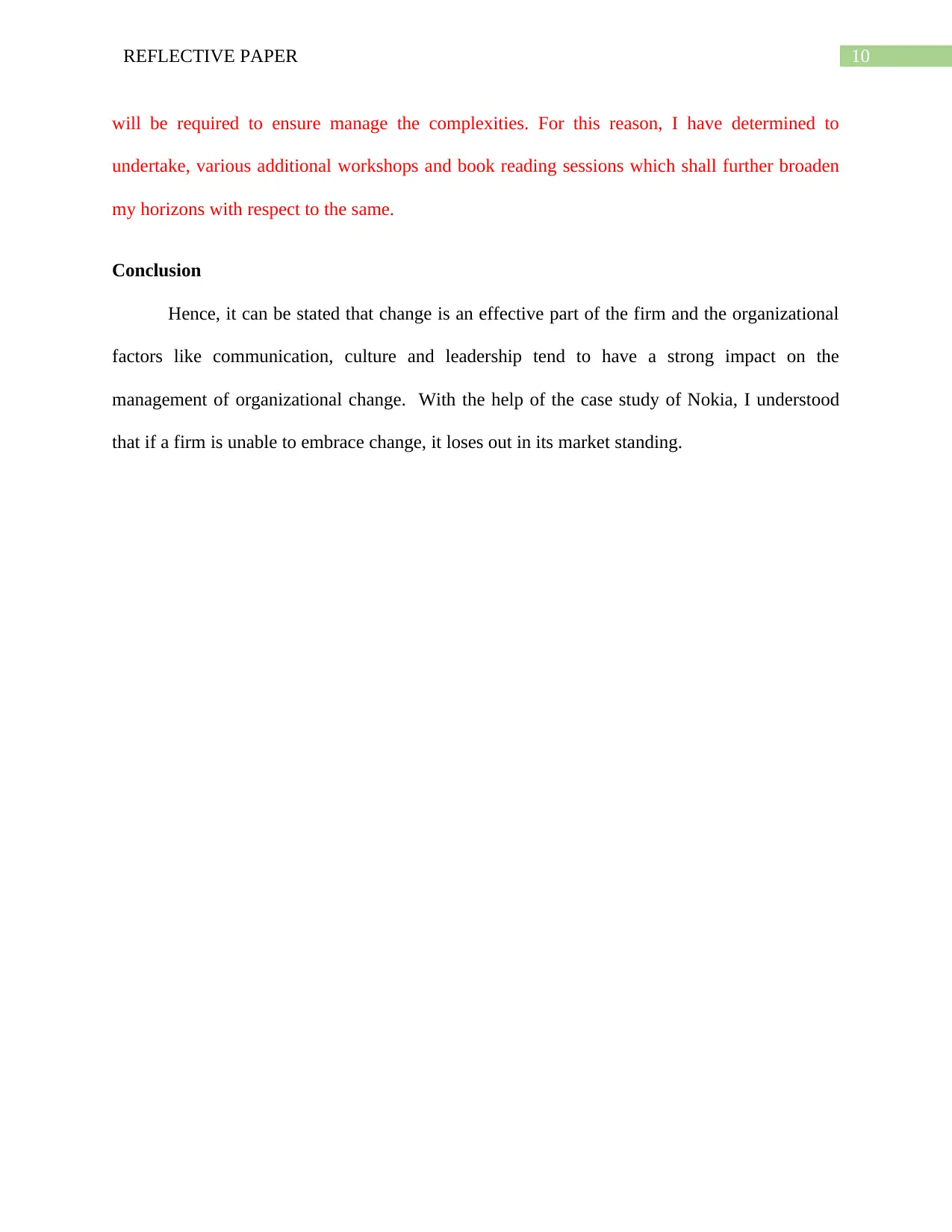
10REFLECTIVE PAPER
will be required to ensure manage the complexities. For this reason, I have determined to
undertake, various additional workshops and book reading sessions which shall further broaden
my horizons with respect to the same.
Conclusion
Hence, it can be stated that change is an effective part of the firm and the organizational
factors like communication, culture and leadership tend to have a strong impact on the
management of organizational change. With the help of the case study of Nokia, I understood
that if a firm is unable to embrace change, it loses out in its market standing.
will be required to ensure manage the complexities. For this reason, I have determined to
undertake, various additional workshops and book reading sessions which shall further broaden
my horizons with respect to the same.
Conclusion
Hence, it can be stated that change is an effective part of the firm and the organizational
factors like communication, culture and leadership tend to have a strong impact on the
management of organizational change. With the help of the case study of Nokia, I understood
that if a firm is unable to embrace change, it loses out in its market standing.
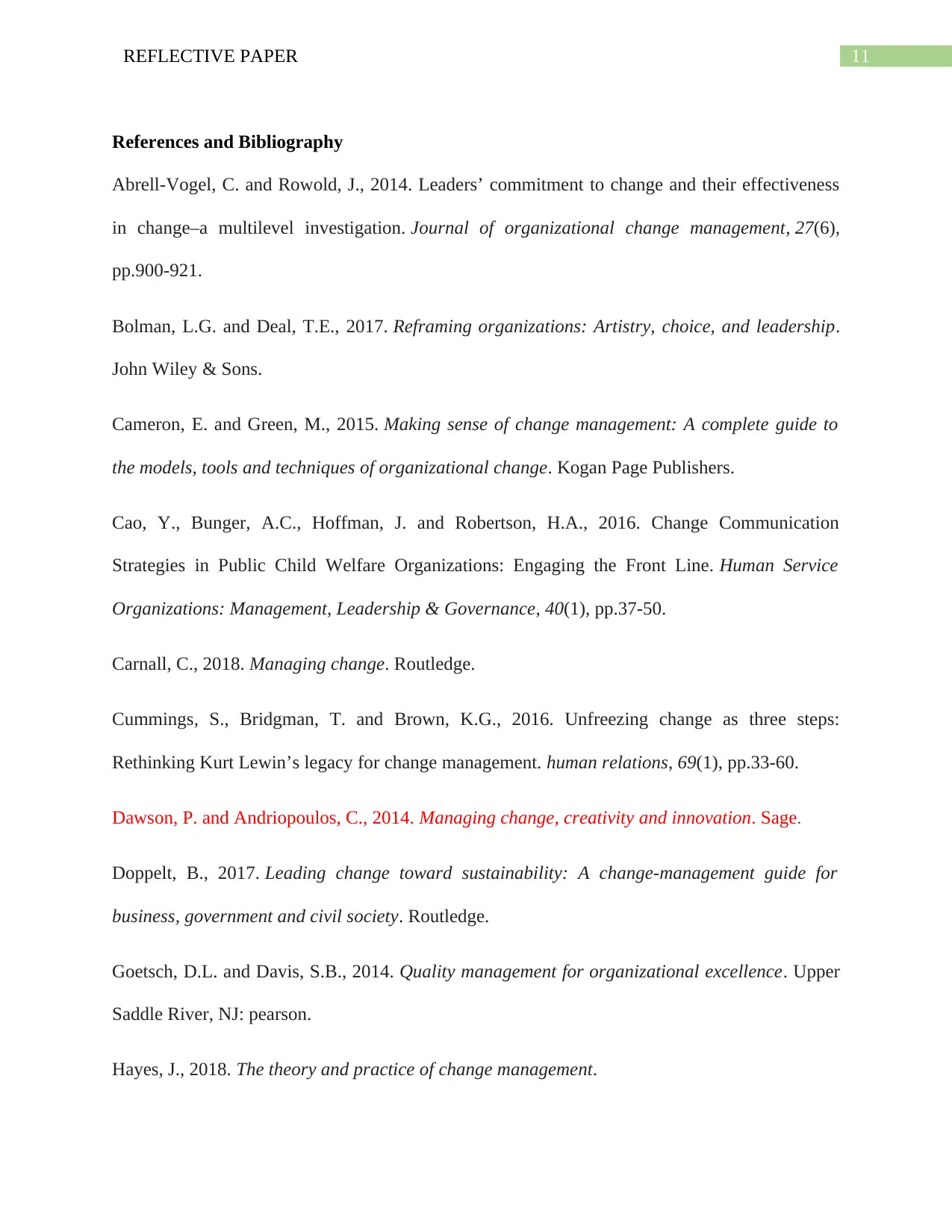
11REFLECTIVE PAPER
References and Bibliography
Abrell-Vogel, C. and Rowold, J., 2014. Leaders’ commitment to change and their effectiveness
in change–a multilevel investigation. Journal of organizational change management, 27(6),
pp.900-921.
Bolman, L.G. and Deal, T.E., 2017. Reframing organizations: Artistry, choice, and leadership.
John Wiley & Sons.
Cameron, E. and Green, M., 2015. Making sense of change management: A complete guide to
the models, tools and techniques of organizational change. Kogan Page Publishers.
Cao, Y., Bunger, A.C., Hoffman, J. and Robertson, H.A., 2016. Change Communication
Strategies in Public Child Welfare Organizations: Engaging the Front Line. Human Service
Organizations: Management, Leadership & Governance, 40(1), pp.37-50.
Carnall, C., 2018. Managing change. Routledge.
Cummings, S., Bridgman, T. and Brown, K.G., 2016. Unfreezing change as three steps:
Rethinking Kurt Lewin’s legacy for change management. human relations, 69(1), pp.33-60.
Dawson, P. and Andriopoulos, C., 2014. Managing change, creativity and innovation. Sage.
Doppelt, B., 2017. Leading change toward sustainability: A change-management guide for
business, government and civil society. Routledge.
Goetsch, D.L. and Davis, S.B., 2014. Quality management for organizational excellence. Upper
Saddle River, NJ: pearson.
Hayes, J., 2018. The theory and practice of change management.
References and Bibliography
Abrell-Vogel, C. and Rowold, J., 2014. Leaders’ commitment to change and their effectiveness
in change–a multilevel investigation. Journal of organizational change management, 27(6),
pp.900-921.
Bolman, L.G. and Deal, T.E., 2017. Reframing organizations: Artistry, choice, and leadership.
John Wiley & Sons.
Cameron, E. and Green, M., 2015. Making sense of change management: A complete guide to
the models, tools and techniques of organizational change. Kogan Page Publishers.
Cao, Y., Bunger, A.C., Hoffman, J. and Robertson, H.A., 2016. Change Communication
Strategies in Public Child Welfare Organizations: Engaging the Front Line. Human Service
Organizations: Management, Leadership & Governance, 40(1), pp.37-50.
Carnall, C., 2018. Managing change. Routledge.
Cummings, S., Bridgman, T. and Brown, K.G., 2016. Unfreezing change as three steps:
Rethinking Kurt Lewin’s legacy for change management. human relations, 69(1), pp.33-60.
Dawson, P. and Andriopoulos, C., 2014. Managing change, creativity and innovation. Sage.
Doppelt, B., 2017. Leading change toward sustainability: A change-management guide for
business, government and civil society. Routledge.
Goetsch, D.L. and Davis, S.B., 2014. Quality management for organizational excellence. Upper
Saddle River, NJ: pearson.
Hayes, J., 2018. The theory and practice of change management.
⊘ This is a preview!⊘
Do you want full access?
Subscribe today to unlock all pages.

Trusted by 1+ million students worldwide
1 out of 13
Related Documents
Your All-in-One AI-Powered Toolkit for Academic Success.
+13062052269
info@desklib.com
Available 24*7 on WhatsApp / Email
![[object Object]](/_next/static/media/star-bottom.7253800d.svg)
Unlock your academic potential
Copyright © 2020–2025 A2Z Services. All Rights Reserved. Developed and managed by ZUCOL.




